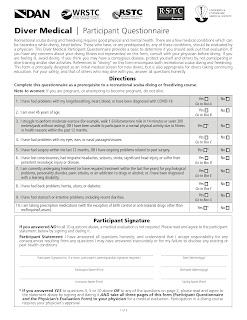So you want to get started but unsure where or how?
First up, you can just go on to google, type something like "dive centres" or any of the diving certifications associations, PADI, SSI, NAUI just to name a few.. and hundreds and thousands of listings will come up..
1. Choose a reputable dive centre/dive shop/dive schools - they all mean the same
Ask friends, ask for recommendations, read up reviews, search their Facebook or Instagram.. Chances are if the dive center is reputable enough, you will find their social media active with majority positive comments..
Reputable dive centres can cost a little bit more apple-to-apple, but you can be assured that safety is always paramount and a priority.. No, I am not just talking about Covid precautions, but their safety records in terms of accidents, air refills, equipment service and maintenance, etc..
2. Know yourself
Know your health history and be truthful about it.. the RSTC checklist has a long list of "NO" that you have to tick, any "YES" doesn't mean you can't dive, it just means you need to get your doctor to certify that you are fit to dive, because ultimately YOU yourself is responsible for your own safety..
Some medical conditions permanently disqualify you from diving, some temporary.. make sure you understand the risks and know what you have (or not) before you go diving..
The latest RSTC medical checklist:
3. Do you need to know how to swim?
Short answer - yes.
Long answer - yes but not exactly. I'll explain a little bit more..
There will be a 200m swimming test (or a 300m snorkel test) unaided and a 10minute floating test.. You can use whatever styles to swim, and there is no time limit. Of course the swim test and floating test will not be back-to-back one after another, not heard of one who does that.. And if the dive centre or instructor does not ask you to do this, then you know they skipped the syllabus!
As long as you can propel yourself through water, take breaths while doing so, the 200m is not that far a distance.. or 300m if you use a snorkel (however I do not recommend this, why go the extra distance??).. It's not a test of stamina - it's just a test to make sure you can swim to safety or swim to reach a floating object or whatever it may be in case you are lost at sea..
My advice is to just swim the stroke you are most comfortable with, slow and easy, watch where you are going and be done with it..
Totally not knowing how to swim? Then spend sometime to go learn swimming, at least some basics and come back again to take the Open Water course..
On the floating test, it will be easier if in the sea (calm sea that is) and with wetsuit on.. In case that is not possible, then wearing wetsuit in the swimming pool helps you float easier.. you don't have to thread water like a mad dog, you just need to stay afloat, not standing and not holding on to anything for 10 minutes..
10 minutes will go by very quickly.. Relax, lean back, chill, slight movements..
4. What equipment do I need?
As a new Open Water diver, you are not expected to have bought any equipment, after all, you wouldn't know.. As with any training courses, equipment rental are very likely to be included in your course fees..
If you are absolutely concerned about sharing, have your own mask, snorkel, mouth piece at the very least.. These are the things that sit closest on your face or in your mouth.. A mouth piece would usually come sanitized before your use, but you can also wipe it down with a sanitizer before use..
If you are thinking of buying, a set of mask and snorkel generally can set you back starting from RM50 onwards all the way till like RM1K and a mouthpiece should go for about RM20 or so, you can get it through online as well and they come in moulded and unmoulded form..
The next thing you want to invest in is a dive computer.. Dive computers are personal items - it records your dives, your dive profiles, air, depth and a whole myriad of things.. But it doesn't know if you are sharing it with others.. Generally, don't share your dive computer - especially during a trip..
Because dive computers keep a record of nitrogen saturation in your body, it is important not to share dive computer with others.. A mistake here can be fatal..
5. Is diving an expensive sport?
Diving is not cheap.. throw in the courses you need, the equipment, the travels, clocking up dives.. It's like golf.. there's plenty of things you will need along the way.. I mean, some people never buy anything really, but if you want to keep diving, you are going to be buying stuffs to personalise it or to call it your own..
By the time you reach 50 dives, you probably would have spent somewhere RM12k minimum just diving alone, excluding buying gears, travelling expenses and so son..
Throw in courses and going by the minimum requisites to at least get Rescue Diver, you would have spent RM15k minimum..
Do the maths..
6. I seen a lot about Enriched Air. What is it?
The air we normally breathe contains 21% oxygen, and about 79% nitrogen. For the sake of simplicity, let just say its 79% nitrogen with other negligible elements..
In Enriched Air, we pumped up the percentage of oxygen in the cylinder anywhere 22% to 40% for recreational diver, essentially reducing the percentage of nitrogen in it.
Enriched Air Nitrox cylinders are marked with bright yellow and green stickers.. Ordinary cylinders do not..
The tank we carry is called a scuba cylinder, not and never an oxygen tank. We don't carry oxygen tank, that is for first aid use in an emergency only, at the surface.
Under pressure, nitrogen has a narcotic effect on our bodies.. We get the feeling of being "high", drunk, light headed, headache, and unknowingly you start talking to fishes, to the rock or the sand... That's how being "narc" is like.. It impairs our judgement, slows down reaction and a host other things, that can be dangerous.. Other than that, our diving time (bottom time) is also impacted and greatly reduced the deeper we go.. At 30m, you only have 11 minutes of bottom time.. You must never exceed that time limit otherwise your dive would be a deco dive, which is another whole topic by itself!
So to increase the bottom time, we increase the percentage of oxygen and reduce the percentage of nitrogen in the cylinder..
Less nitrogen = less chances of getting narc = longer bottom time.
BUT.
Higher percentage of oxygen poses another set of problems..
The higher the percentage of oxygen, the shallower you can bring it to.. Oxygen is toxic under pressure, this is called oxygen toxicity and it's dangerous and fatal..
That is why, in order to use Enriched Air, you must be certified and trained as an Enriched Air Diver, and all dive centers around the world will require you to show proof of this certification before you can dive with Enriched Air..
Anyway back to the topic, the normal oxygen percentage blends are 32% and 36%.. At 32% oxygen, your maximum depth is 33 metres, and at 36%, it reduces to around 28 metres.. You must never, never exceed these depth..
Before any dive with Enriched Air, you must also analyse the cylinder and confirmed the oxygen percentage.. You then write the percentage, date, your name and the maximum depth on the cylinder.. From then on until the end of the dive, this cylinder belongs to you and you only.. Other divers CANNOT use yours and vice-versa, even if both has the same oxygen percentage in it.. DO NOT SHARE..
Oh ya, you also look cooler diving Enriched Air :)
7. If diving is so dangerous, why dive?
Much like anything else, bungee jumping, sky diving, horse riding, rock climbing... each and all sports have its risks and dangers.. Just don't be an idiot..
Follow the rules, listen to what more experienced divers/instructors/guides say, and always be humble, ready to keep an open mind..
Arrogrance and being an idiot is always a recipe for disaster, don't be a statistic..
The underwater world can be very fascinating, especially if you do chance upon marine life that you so want to see.. Take the plunge for yourself..












No comments:
Post a Comment